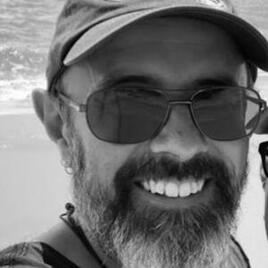|
I've got two words for you: Cunliffe rules. In fact, Michael Cunliffe is so gifted, he's the first poet other than Sylvia Plath and Camille Ralphs to get his own category on my blog. That's fine company -- I'd love to be mentioned in the same breath as either of those poets. Cunliffe earned this distinction despite two formidable hurdles. First, as far as I know he never formally publishes his work, which is not a big deal, but it makes it harder for poets like me who read mainly in the literary journals to discover him. The second problem is a bit more problematic. It's that Michael Cunliffe doesn't exist. Sure he has a name, a body, an enthusiastic Facebook following, and maybe even a wife, kids, grandkids, cousins and uncles and dogs and chickens. He's exactly the kind of guy I'd like to smoke a pipe with, chug an ale with, sip some wine with -- or talk poetry with because he's got game. The problem is: there is no Michael Cunliffe. Every day in every way, poetry is eating the Michael we all know and love and replacing him with pure creativity. In other words, Cunliffe's swimming so freely in the Kether mind of Bell's interconnectedness and Buber's I-and-Thou, that he's breathing in pure archetypes and exhaling mind-bending poems. Take a look at, "Michael is not a Poet," which you can read by clicking the picture above. Notice anything? Of course. There's actually two poems. It's a dialogue. One might say, a concrete expression of eudaimonia (in an esoteric sense) if one were a gnostic magus. Since most of us probably aren't, let's try another angle of attack. What Michael's doing here is digging just about as far into the nature of being that can be accomplished in what must be called accessible language. One can perhaps plumb more deeply into the nature of being with other forms of language, but Being wants expression in all forms of language. If you read the poem, you'll quickly see that the message is up-front; the words slip easy into your mind and soul. And yet, the poem is a mystical event, no less than Crane's "Atlantis" or Roethke's ""The Far Field." Don't believe me? Try these lines: I am the spark in the cells-- No, not just in the brain. In each and every cell. Electrons and I dance hand in hand. Compare them with Crane's: Forever Deity’s glittering Pledge, O Thou Whose canticle fresh chemistry assigns To wrapt inception and beatitude,-- Hear me: no thematic difference exists between "Atlantis" and "Michael is not a Poet." Both speak to the Divine and to the celebration of the ego's destruction. Yes, this means Cunliffe has channeled the same message that Crane (and many other artists) picked up from the aether, but he's done so with ordinary aplomb. And for that, he deserves extraordinary praise! @BlackstonDan Categories All
0 Comments
|

